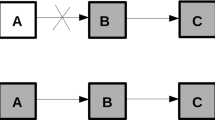Abstract
Argumentation-based frameworks are used as a decision-making mechanism for software agents. This paper aims to investigate how a formal argumentation framework is affected when the underlying causal relationships of its theory is modified in counterfactual situations, the so-called “what if” scenarios. In contrast to previous approaches where causality relationships were derived from static probabilistic distributions, we address scenarios where causal models are intervened. Two novel contributions in the synergy between argumentation and causal theories are presented: 1) we characterize interventions and their consequences in causal argumentation frameworks; and 2) we introduce an account of the so-called sequential interventions that give a characterization of manipulations on time.
Access this chapter
Tax calculation will be finalised at checkout
Purchases are for personal use only
Similar content being viewed by others
References
DoWhy: A Python package for causal inference. https://github.com/microsoft/dowhy
Amgoud, L.: Postulates for logic-based argumentation systems. Int. J. Approx. Reason. 55(9), 2028–2048 (2014)
Amgoud, L., Cayrol, C.: Inferring from inconsistency in preference-based argumentation frameworks. J. Autom. Reason. 29(2), 125–169 (2002)
Arjas, E., Parner, J.: Causal reasoning from longitudinal data. Scand. J. Stat. 31(2), 171–187 (2004)
Dung, P.M.: On the acceptability of arguments and its fundamental role in nonmonotonic reasoning, logic programming and n-person games. Artif. Intell. 77(2), 321–357 (1995)
Gabbay, D.M., Rodrigues, O.: Probabilistic argumentation: an equational approach. Log. Univers. 9(3), 345–382 (2015)
Galles, D., Pearl, J.: Axioms of causal relevance. Artif. Intell. 97(1–2), 9–43 (1997)
Gelfond, M., Lifschitz, V.: Classical negation in logic programs and disjunctive databases. New Gener. Comput. 9(3–4), 365–385 (1991)
Guerrero, E., Nieves, J.C., Lindgren, H.: Semantic-based construction of arguments: an answer set programming approach. Int. J. Approx. Reason. 64, 54–74 (2015)
Guerrero, E., Nieves, J.C., Sandlund, M., Lindgren, H.: Activity qualifiers in an argumentation framework as instruments for agents when evaluating human activity. In: Demazeau, Y., Ito, T., Bajo, J., Escalona, M.J. (eds.) PAAMS 2016. LNCS (LNAI), vol. 9662, pp. 133–144. Springer, Cham (2016). https://doi.org/10.1007/978-3-319-39324-7_12
Halpern, J.Y., Pearl, J.: Causes and explanations: a structural-model approach. Part II: Explanations. Br. J. Philos. Sci. 56(4), 889–911 (2005)
Harel, D.: First-Order Dynamic Logic. Lecture Notes in Computer Science, vol. 68. Springer, Heidelberg (1979). https://doi.org/10.1007/3-540-09237-4
Hunter, A.: A probabilistic approach to modelling uncertain logical arguments. Int. J. Approx. Reason. 54(1), 47–81 (2013)
Li, H., Oren, N., Norman, T.J.: Probabilistic argumentation frameworks. In: Modgil, S., Oren, N., Toni, F. (eds.) TAFA 2011. LNCS (LNAI), vol. 7132, pp. 1–16. Springer, Heidelberg (2012). https://doi.org/10.1007/978-3-642-29184-5_1
Lindgren, H., et al.: The Star-C Intelligent Coach: A Crossdisciplinary Design Process of a Behaviour Change Intervention in Primary Care. Prague, Czech Republic (2020, in press)
Morveli-Espinoza, M., Nieves, J.C., Augusto Tacla, C.: Towards an imprecise probability approach for abstract argumentation. In: 24th European Conference on Artificial Intelligence (ECAI 2020), Including 10th Conference on Prestigious Applications of Artificial Intelligence (PAIS 2020), Virtual, 29 August–8 September 2020, pp. 2921–2922. IOS Press (2020)
Morveli-Espinoza, M., Nieves, J.C., Tacla, C.A.: An imprecise probability approach for abstract argumentation based on credal sets. In: Kern-Isberner, G., Ognjanović, Z. (eds.) ECSQARU 2019. LNCS (LNAI), vol. 11726, pp. 39–49. Springer, Cham (2019). https://doi.org/10.1007/978-3-030-29765-7_4
Ng, N., et al.: Sustainable behavior change for health supported by person-tailored, adaptive, risk-aware digital coaching in a social context: study protocol for the STAR-C research programme. Front. Public Health 9, 138 (2021)
Norberg, M., Wall, S., Boman, K., Weinehall, L.: The Västerbotten Intervention Programme: background, design and implications. Glob. Health Action 3(1), 4643 (2010)
Pearl, J.: Causal diagrams for empirical research. Biometrika 82(4), 669–688 (1995)
Pearl, J.: Probabilities of causation: three counterfactual interpretations and their identification. Synthese 121(1–2), 93–149 (1999)
Pearl, J.: An introduction to causal inference. Int. J. Biostat. 6(2), 1643–1662 (2010)
Thimm, M.: The Tweety library collection for logical aspects of artificial intelligence and knowledge representation. Künstl. Intell. 31(1), 93–97 (2017)
Tian, J., Pearl, J.: Probabilities of causation: bounds and identification. Ann. Math. Artif. Intell. 28(1–4), 287–313 (2000)
Acknowledgment
Research was supported by Forte, the Swedish Research Council for Health, Working Life and Welfare, which supports the STAR-C project during 2019–2024 (Dnr. 2018-01461).
Author information
Authors and Affiliations
Corresponding author
Editor information
Editors and Affiliations
Rights and permissions
Copyright information
© 2021 Springer Nature Switzerland AG
About this paper
Cite this paper
Guerrero, E. (2021). Causal Interventions and Argumentation-Based Frameworks: Formalization of “What If” Scenarios. In: De La Prieta, F., El Bolock, A., Durães, D., Carneiro, J., Lopes, F., Julian, V. (eds) Highlights in Practical Applications of Agents, Multi-Agent Systems, and Social Good. The PAAMS Collection. PAAMS 2021. Communications in Computer and Information Science, vol 1472. Springer, Cham. https://doi.org/10.1007/978-3-030-85710-3_13
Download citation
DOI: https://doi.org/10.1007/978-3-030-85710-3_13
Published:
Publisher Name: Springer, Cham
Print ISBN: 978-3-030-85709-7
Online ISBN: 978-3-030-85710-3
eBook Packages: Computer ScienceComputer Science (R0)



